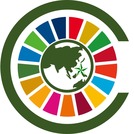
These are two resources for the COAST Program: The modules and the Google Map.
- Subject:
- Cultural Geography
- Material Type:
- Full Course
- Interactive
- Lesson
- Module
- Author:
- Paul Anthony Notorio
- Date Added:
- 07/24/2022

These are two resources for the COAST Program: The modules and the Google Map.

In this course the conquest and colonization of the Americas is considered, with special attention to the struggles of native peoples in Guatemala, Canada, Brazil, Panama, and colonial New England. In two segments of the course-one devoted to the Jesuit missionization of the Huron in the 1630s, the other to struggles between the government of Panama and the Kuna between 1900 and 1925-students examine primary documents such as letters, reports, and court records, to draw their own conclusions. Attention focuses on how we know about and represent past eras and other peoples, as well as on the history of struggles between native Americans and Europeans.

Introductory module on contemporary China in the world. Intended for community college students and lower division students enrolled in relevant courses in global studies, international studies, international relations, Asian studies, and political science. Includes suggested readings, lesson plan, and ancillary materials (lecture slides, notes, and student handout).

Central to our era is the gradual movement of all the world's regions toward a uniform standard of economic and political development. In this class we will read a variety of recent narratives that partake of, dissent from, or contribute to this story, ranging from novels and poems to World Bank and IMF statements and National Geographic reports. We will seek to understand the many motives and voices – sometimes congruent, sometimes clashing – that are currently engaged in producing accounts of people in the developing world: their hardships, laughter, and courage, and how they help themselves and are helped by outsiders who may or may not have philanthropic motives. Readings will include literature by J. G. Ballard, Jamaica Kincaid, Rohinton Mistry, and John le Carré, as well as policy documents, newspaper and magazine articles, and the Web sites of a variety of trade and development commissions and organizations.
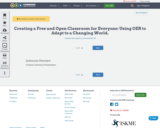
Creative Commons Presentation
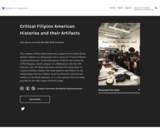
Short Description:
The contents of this online book were created by Prof. Rick Bonus and his students as a final project for a course on “Critical Filipinx American Histories” in the Fall quarter of 2019 at the University of Washington, Seattle campus. In collaboration with the UW Libraries, the UW Burke Museum, and the UW Department of American Ethnic Studies, this book explores and reflects on the relationships between Filipinx American histories and selected artifacts at the Burke Museum. It is a class project that was made possible by the Allen Open Textbook Grant.
Word Count: 18767
(Note: This resource's metadata has been created automatically as part of a bulk import process by reformatting and/or combining the information that the author initially provided. As a result, there may be errors in formatting.)
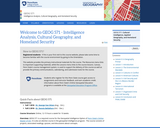
GEOG 571 explores the relationships between culture and civil security and the process of geographically analyzing social, political, economic, and demographic information to understand human history, institutions, and behaviors. It is an elective course in the Geospatial Intelligence Certificate, the Intercollege Master of Professional Studies (iMPS-HLS), and the Master of Geographic Information Systems degree program that is offered exclusively through Penn State's World Campus. It is also one of the optional capstone courses that leads to Penn State's Postbaccalaureate Certificate in GIS. The course consists of projects, associated readings, and exams.

In the trilogy of D-Lab courses, D-Lab: Dissemination focuses on disseminating innovations among underserved communities, especially in developing countries. Students acquire skills related to building partnerships and piloting, financing, implementing, and scaling-up a selected innovation for the common good. The course is structured around MIT and outside competitions. Teams develop an idea, project or (social) business plan that is "ready to roll" by term's end. Course includes an on-line forum discussion board, student-led case studies and a final proposal or business plan for realizing your dream innovation.

D-Lab: Energy offers a hands-on, project-based approach that engages students in understanding and addressing the applications of small-scale, sustainable energy technology in developing countries where compact, robust, low-cost systems for generating power are required. Projects may include micro-hydro, solar, or wind turbine generators along with theoretical analysis, design, prototype construction, evaluation and implementation. Students will have the opportunity both to travel to Nicaragua during spring break to identify and implement projects.
D-Lab: Energy is part of MIT's D-Lab program, which fosters the development of appropriate technologies and sustainable solutions within the framework of international development.
This course is an elective subject in MIT’s undergraduate Energy Studies Minor. This Institute-wide program complements the deep expertise obtained in any major with a broad understanding of the interlinked realms of science, technology, and social sciences as they relate to energy and associated environmental challenges.

D-Lab Development addresses issues of technological improvements at the micro level for developing countries—in particular, how the quality of life of low-income households can be improved by adaptation of low cost and sustainable technologies. Discussion of development issues as well as project implementation challenges are addressed through lectures, case studies, guest speakers and laboratory exercises. Students form project teams to partner with mostly local level organizations in developing countries, and formulate plans for an IAP site visit. (Previous field sites include Ghana, Brazil, Honduras and India.) Project team meetings focus on developing specific projects and include cultural, social, political, environmental and economic overviews of the countries and localities to be visited as well as an introduction to the local languages.

D-Lab: Design addresses problems faced by undeserved communities with a focus on design, experimentation, and prototyping processes. Particular attention is placed on constraints faced when designing for developing countries. Multidisciplinary teams work on semester-long projects in collaboration with community partners, field practitioners, and experts in relevant fields. Topics covered include design for affordability, design for manufacture, sustainability, and strategies for working effectively with community partners and customers. Students may continue projects begun in EC.701J D-Lab I: Development.

D-Lab Health provides a multidisciplinary approach to global health technology design via guest lectures and a major project based on fieldwork. We will explore the current state of global health challenges and learn how to design medical technologies that address those problems. Students may travel to Nicaragua during spring break to work with health professionals, using medical technology design kits to gain field experience for their device challenge. As a final class deliverable, you will create a product design solution to address challenges observed in the field. The resulting designs are prototyped in the summer for continued evaluation and testing.

This course introduces concepts of supply chain design and operations with a focus on supply chains for products destined to improve quality of life in developing countries. Topics include demand estimation, capacity planning and process analysis, inventory management, and supply chain coordination and performance. We also cover issues specific to emerging markets, such as sustainable supply chains, how to couple product design with supply chain design and operation, and how to account for the value-adding role of a supply chain. A major aspect of class is the student projects on supply chain design or improvement.

This introductory course will provide you with a multidisciplinary approach to managing waste in low- and middle-income countries, with strategies that diminish greenhouse gas emissions and provide enterprise opportunities for marginalized populations. You will focus on understanding some of the multiple dimensions of waste generation and management. Topics are presented in real contexts through case studies, field visits, civic engagement and research, and include consumer culture, waste streams, waste management, entrepreneurship and innovation on waste, technology evaluation, downcycling / upcycling, Life Cycle Analysis and waste assessment. Labs include building low-cost, small scale technology, field trips to waste-related institutions and businesses, art workshops and e-waste scrapping taught by practitioners, artists and waste enthusiasts.

This course focuses on disseminating Water, Sanitation and Hygiene (WASH) or water/environment innovations in developing countries and underserved communities worldwide. It emphasizes core WASH and water/environment principles, culture-specific solutions, tools for start-ups, appropriate and sustainable technologies, behavior change, social marketing, building partnerships, and the theory and practice of innovation diffusion.
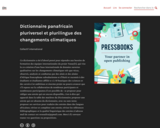
Short Description:
Ce dictionnaire a été d’abord pensé pour répondre aux besoins de formation des équipes internationales du projet Yanayi[1], qui vise la co-création d’une base internationale de données ouvertes qualitatives sur les changements climatiques tels que vécus, observés, analysés et combattus par des aînés et des aînées d’Afrique francophone subsaharienne et d’Haïti et racontés à des étudiants et étudiantes affilié-e-s à 10 boutiques des sciences et des savoirs.Cet ambitieux et énorme projet ne pourra avancer que s’il repose sur la collaboration de nombreux participants et nombreuses participantes.Il est possible de : se proposer pour rédiger une entrée qui est encore disponible, c’est-à-dire qui apparaît dans la table des matières du Dictionnaire; proposer une entrée qui est absente du dictionnaire, avec ou sans texte; proposer ses services pour traduire des entrées dans des langues africaines; réviser et compléter une entrée; réviser les références bibliographiques et la qualité linguistique des entrées.L’adresse mail de contact est reseauliraj@gmail.com. Merci d’y envoyer toutes vos questions ou propositions.
Long Description:
Ce dictionnaire a été d’abord pensé pour répondre aux besoins de formation des équipes internationales du projet Yanayi[1], qui vise la co-création d’une base internationale de données ouvertes qualitatives sur les changements climatiques tels que vécus, observés, analysés et combattus par des aînés et des aînées d’Afrique francophone subsaharienne et d’Haïti et racontés à des étudiants et étudiantes affilié-e-s à 10 boutiques des sciences et des savoirs.
Cet ambitieux et énorme projet ne pourra avancer que s’il repose sur la collaboration de nombreux participants et nombreuses participantes.
Il est possible de : se proposer pour rédiger une entrée qui est encore disponible, c’est-à-dire qui apparaît dans la table des matières du Dictionnaire; proposer une entrée qui est absente du dictionnaire, avec ou sans texte; proposer ses services pour traduire des entrées dans des langues africaines; réviser et compléter une entrée; réviser les références bibliographiques et la qualité linguistique des entrées. L’adresse mail de contact est reseauliraj@gmail.com. Merci d’y envoyer toutes vos questions ou propositions.
Word Count: 2493
(Note: This resource's metadata has been created automatically as part of a bulk import process by reformatting and/or combining the information that the author initially provided. As a result, there may be errors in formatting.)

Population growth does impact energy use, but per capita energy consumption varies greatly across countries due to factors like geography, climate, economic structure, policies, and cultural preferences. Countries with small populations can have high energy consumption, while countries with large populations may use less energy.
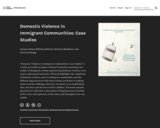
Short Description:
“Domestic Violence in Immigrant Communities: Case Studies” is a freely accessible eCampus Ontario Pressbook containing case studies of immigrant women experiencing domestic violence to be used as educational materials. The book highlights the complexity of domestic violence cases in immigrant communities and the different legal processes that these women encounter in seeking justice and the challenges they face in relation to re-establishing their own lives and the lives of their children. The book contains questions for reflection; a description of legal processes involved in DV cases, and a glossary of the terms used throughout the case studies.
Long Description:
“Domestic Violence in Immigrant Communities: Case Studies” is a freely accessible eCampus Ontario Pressbook containing case studies of immigrant women experiencing domestic violence to be used as educational materials. The contents were created by analysing closed legal case files of 15 immigrant women living in Ontario who experienced domestic violence. The comprehensive case studies that emerge from this research present domestic violence experienced by immigrant women in all its complexity, highlighting their unique vulnerability at the intersections of race, gender and immigration status. The book also highlights the different legal processes that these women encounter in seeking justice and the challenges they face in relation to re-establishing their own lives and the lives of their children. In addition to the cases, the book contains questions for reflection; a description of legal processes involved in DV cases, and a glossary of the terms used throughout the case studies. This interactive Pressbook is an ideal resource for social work and legal practitioners, including students in social service work, social work and law programs, in order to increase their understanding about the complexity of domestic violence cases in immigrant families and develop strategies for culturally informed interventions.
Word Count: 42082
(Note: This resource's metadata has been created automatically by reformatting and/or combining the information that the author initially provided as part of a bulk import process.)

In essay format, this textbook considers examples of various sub-categories of Geography in combination with five regions of the Eastern World.
Created for GEOGR 1105 - Eastern World Geography at the College of DuPage. This resource will be updated as needed. For the most recent version, visit: https://cod.pressbooks.pub/easternworlddailyreadingsgeography/
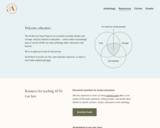
The book "All We Can Save" is an anthology of writings by women at the forefront of the
climate movement who are harnessing truth, courage, and solutions to lead
humanity forward. This Creative Commons licensed collection of educator resources includes a discussion question bank, various assignments, summaries of each essay in the book, and other resources.